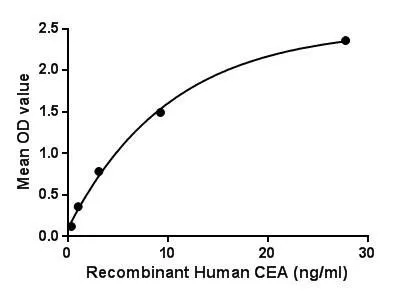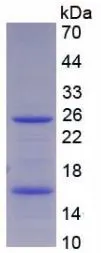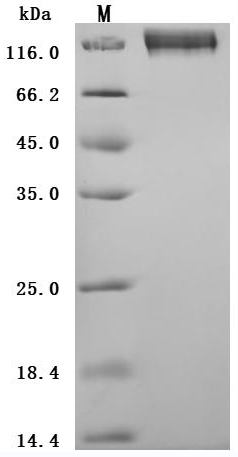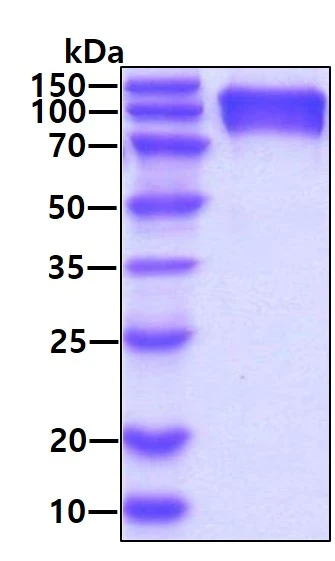
Functional ELISA analysis of GTX00181-pro Human CD66e protein which can bind immobilized GLA4 protein.
Human CD66e protein, His tag
GTX00181-PRO
ApplicationsFunctional Assay
Product group Proteins / Signaling Molecules
Protein IDP06731
Overview
- SupplierGeneTex
- Product NameHuman CD66e protein, His tag
- Delivery Days Customer9
- Application Supplier NoteCarcinoembryonic antigen (CEA) which are characterized as members of the CD66 cluster of differentiation have highly related glycoproteins involved in cell adhesion. It also can be used as a tumor marker in clinical tests. CEA are glycosyl phosphatidyl inositol (GPI) cell-surface-anchored glycoproteins whose specialized sialofucosylated glycoforms serve as functional colon carcinoma L-selectin and E-selectin ligands. Besides, Galectin 4 (GAL4) has been identified as an interactor of CEA, thus a binding ELISA assay was conducted to detect the interaction of recombinant human CEA and recombinant human GLA4. Briefly, CEA were diluted serially in PBS, with 0.01% BSA (pH 7.4). Duplicate samples of 100 microl were then transferred to GLA4-coated microtiter wells and incubated for 2h at 37C. Wells were washed with PBST and incubated for 1h with anti-CEA pAb, then aspirated and washed 3 times. After incubation with HRP labelled secondary antibody, wells were aspirated and washed 3 times. With the addition of substrate solution, wells were incubated 15-25 minutes at 37C. Finally, add 50 microl stop solution to the wells and read at 450nm immediately. The binding activity of CEA and GLA4 was in a dose dependent manner.
- ApplicationsFunctional Assay
- CertificationResearch Use Only
- ConjugateUnconjugated
- Gene ID1048
- Target nameCEACAM5
- Target descriptionCEA cell adhesion molecule 5
- Target synonymsCD66e, CEA, cell adhesion molecule CEACAM5, carcinoembryonic antigen related cell adhesion molecule 5, meconium antigen 100
- Protein IDP06731
- Protein NameCell adhesion molecule CEACAM5
- Scientific DescriptionThis gene encodes a cell surface glycoprotein that represents the founding member of the carcinoembryonic antigen (CEA) family of proteins. The encoded protein is used as a clinical biomarker for gastrointestinal cancers and may promote tumor development through its role as a cell adhesion molecule. Additionally, the encoded protein may regulate differentiation, apoptosis, and cell polarity. This gene is present in a CEA family gene cluster on chromosome 19. Alternative splicing results in multiple transcript variants. [provided by RefSeq, Jul 2015]
- Storage Instruction-20°C or -80°C,2°C to 8°C
- UNSPSC41116100
- SpeciesHuman






